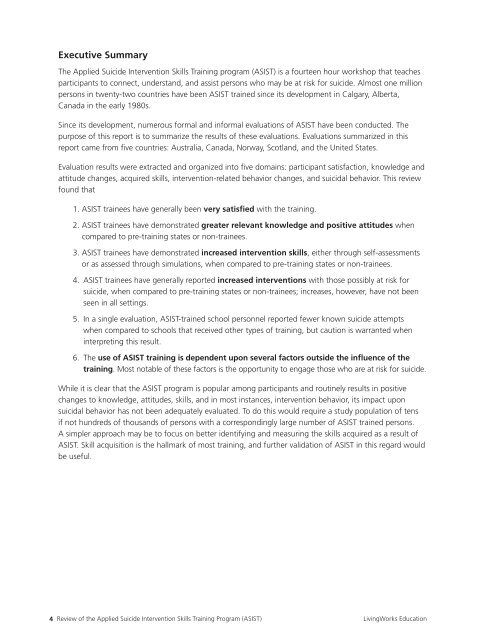Review of the Applied Suicide Intervention Skills Training Program ...
Review of the Applied Suicide Intervention Skills Training Program ...
Review of the Applied Suicide Intervention Skills Training Program ...
You also want an ePaper? Increase the reach of your titles
YUMPU automatically turns print PDFs into web optimized ePapers that Google loves.
Executive Summary<br />
The <strong>Applied</strong> <strong>Suicide</strong> <strong>Intervention</strong> <strong>Skills</strong> <strong>Training</strong> program (ASIST) is a fourteen hour workshop that teaches<br />
participants to connect, understand, and assist persons who may be at risk for suicide. Almost one million<br />
persons in twenty-two countries have been ASIST trained since its development in Calgary, Alberta,<br />
Canada in <strong>the</strong> early 1980s.<br />
Since its development, numerous formal and informal evaluations <strong>of</strong> ASIST have been conducted. The<br />
purpose <strong>of</strong> this report is to summarize <strong>the</strong> results <strong>of</strong> <strong>the</strong>se evaluations. Evaluations summarized in this<br />
report came from five countries: Australia, Canada, Norway, Scotland, and <strong>the</strong> United States.<br />
Evaluation results were extracted and organized into five domains: participant satisfaction, knowledge and<br />
attitude changes, acquired skills, intervention-related behavior changes, and suicidal behavior. This review<br />
found that<br />
1. ASIST trainees have generally been very satisfied with <strong>the</strong> training.<br />
2. ASIST trainees have demonstrated greater relevant knowledge and positive attitudes when<br />
compared to pre-training states or non-trainees.<br />
3. ASIST trainees have demonstrated increased intervention skills, ei<strong>the</strong>r through self-assessments<br />
or as assessed through simulations, when compared to pre-training states or non-trainees.<br />
4. ASIST trainees have generally reported increased interventions with those possibly at risk for<br />
suicide, when compared to pre-training states or non-trainees; increases, however, have not been<br />
seen in all settings.<br />
5. In a single evaluation, ASIST-trained school personnel reported fewer known suicide attempts<br />
when compared to schools that received o<strong>the</strong>r types <strong>of</strong> training, but caution is warranted when<br />
interpreting this result.<br />
6. The use <strong>of</strong> ASIST training is dependent upon several factors outside <strong>the</strong> influence <strong>of</strong> <strong>the</strong><br />
training. Most notable <strong>of</strong> <strong>the</strong>se factors is <strong>the</strong> opportunity to engage those who are at risk for suicide.<br />
While it is clear that <strong>the</strong> ASIST program is popular among participants and routinely results in positive<br />
changes to knowledge, attitudes, skills, and in most instances, intervention behavior, its impact upon<br />
suicidal behavior has not been adequately evaluated. To do this would require a study population <strong>of</strong> tens<br />
if not hundreds <strong>of</strong> thousands <strong>of</strong> persons with a correspondingly large number <strong>of</strong> ASIST trained persons.<br />
A simpler approach may be to focus on better identifying and measuring <strong>the</strong> skills acquired as a result <strong>of</strong><br />
ASIST. Skill acquisition is <strong>the</strong> hallmark <strong>of</strong> most training, and fur<strong>the</strong>r validation <strong>of</strong> ASIST in this regard would<br />
be useful.<br />
4 <strong>Review</strong> <strong>of</strong> <strong>the</strong> <strong>Applied</strong> <strong>Suicide</strong> <strong>Intervention</strong> <strong>Skills</strong> <strong>Training</strong> <strong>Program</strong> (ASIST) LivingWorks Education


